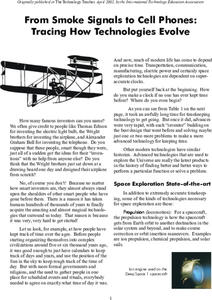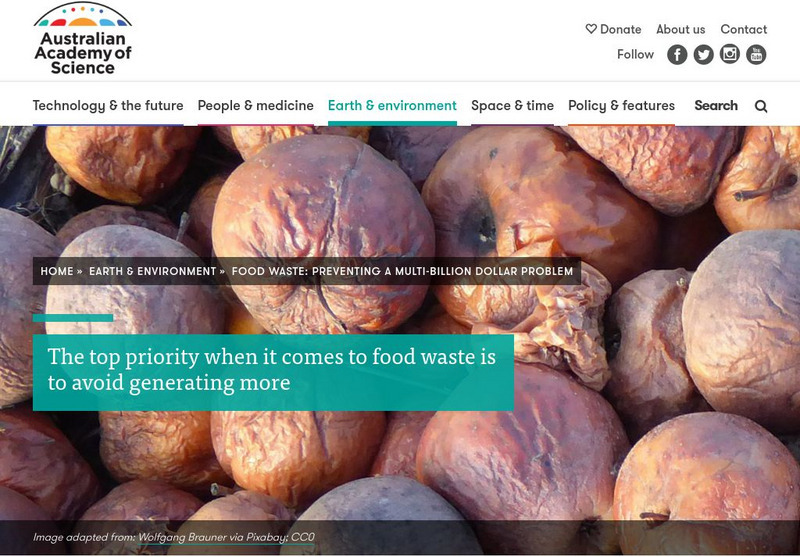NASA
Speaking in Phases
Hear from deep space. Pupils learn how satellites transfer information back to Earth. They learn about three different ways to modulate radio waves and how a satellite sends information with only 0s and 1s. Using sound, class members...
NASA
Write the Book on Weather Metrics
It's not easy to measure the weather. Pupils learn about what all weather has in common—the atmosphere. Scholars discover how a meteorologists must be able to measure aspects of the atmosphere and decipher the data. They then create a...
NASA
Taking a Cold, Clear Look at the Universe
Take a look with another perspective. Pupils read to find out what portion of the electromagnetic spectrum a space telescope sees and the difficulties of viewing infrared radiation from other objects in space. Individuals discover how...
NASA
From Smoke Signals to Cell Phones: Tracing How Technologies Evolve
Explore the science of space exploration. Pupils consider technological advances in propulsion, communication, power, navigation, and imaging. They select one of these areas and create a timeline of historical progress that contributed...
NASA
Taking Apart the Light
Break down light into spectra. Scholars learn how atoms emit and absorb photons and come to understand how this process allows scientists to identify different atoms based on either absorption lines or emission lines. Learners then...
NASA
Packing for a L-o-o-o-ng Trip to Mars
Pack just enough to fit. Crews determine what personal items to take with them on a trip to Mars. Each team must decide what to take with them on a two-and-a-half year trip to Mars and whether their items will fit within the allotted...
NASA
Keeping Nine Eyes on the Weather
Take a look at climate change from another angle. Readers learn about the MISR instrument on the Terra satellite and how it studies Earth. Pupils experience how the multiple cameras give scientists multiple views so they can better study...
NASA
Blinded by the Light!
Pupils learn of multiple ways astronomers look for planets outside of the solar system. By completing a hands-on activity, scholars discover that trying to see the planets directly because of the glare from the nearby star is nearly...
Library of Congress
World Digital Library: Technology and the Representation of the World
An article discussing the tools the Islamic civilization astronomers developed and used to study the stars. Also discussed are the tools used in alchemy and metalworking.
Other
Australian Acad. Of Science: Food Waste: Preventing Multi Billion Dollar Problem
The top priority when it comes to food waste is to avoid generating more. Food waste includes all food intended for human consumption that never reaches us, as well as edible food that consumers throw away. As it rots in landfills, food...
Other
How Technology Is Improving Productivity and Efficiency in Manufacturing Sector
The article describes how the use of different types of technology are improving manufacturing efficiencies, including 3-D printing, metrology (science of measurement), exoskeleton suits, and drones.
Other
Science X: Research Illuminates Inaccuracies in Radiocarbon Dating
This article discusses research on the accuracy of radiocarbon dating. It was determined that the standards used for radiocarbon dating may be flawed due to variations to the radiocarbon cycle in different climatic regions of the world....
Society for Science and the Public
Science News for Students: New Waves for Safe Flying
Discusses technology being used to improve airport security in the wake of the terrorist attacks in recent years. [Date of Article: April 28, 2010]
Other
Mit: A New Angle on Pyramids
A team of researchers at the Massachusetts Institute of Technology investigated whether the ancient Egyptians could have used a synthetic concrete for the huge stones used in building the pyramids. The theory has met enormous resistance...
University of Houston
University of Houston: Engines of Our Ingenuity: No. 435: Hedy Lamarr, Inventor
Read about the remarkable actress Hedy Lamarr who, together with composer George Antheil, invented a technology that used frequency hopping to improve the effectiveness of Allied torpedoes during WWII. Their invention was not put into...
Other
Playdough to Plato: First Grade Stem Activities
This blog contains challenging STEM activities you can use to build confidence and take your teaching to the next level. Included are science, math, technology, and engineering activities.
BBC
Bbc News: Iceman's Final Meal
Doctors use modern technology to determine the last meal of Otzi, the Iceman who was discovered in 1991 who lived approximately 5,300 years ago.
Khan Academy
Khan Academy: Smart Buildings, Transport, and Grids
The advantages and security risks of "Smart" uses of technology in buildings, transportation, and grids are discussed.















